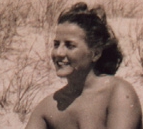
A WRITER'S BAD DAY AT BLACK ROCK
by Peggy Phillips
This was promising to be the worst day of my life.
I had awakened at 4 a.m. and now sat dangling bare feet over the bed
deciding whether or not there was a compelling need for still a third
trip to the bathroom. The stress of the past week had triggered a
siege of galloping diarrhea and I was desperate for a quick fix
before dashing off to the new job.
Nothing to do but call Mother who had a cure for everything --
chicken soup, for a cold, aspirin for a fever, compassion to cushion
the blow at being abandoned in England seven months pregnant by a
husband who announced ( far too late) that he had no interest in
fatherhood.
It was seven o'clock in New York. Three hours ahead of us here in
California, so I knew she would be up. "What's the matter dear?" God,
it was good to hear that warm, familiar voice. She listened as I
explained the predicament.
This was the first day I was to report for work in the Los Angeles
Public Library, an hour's drive from the suburb where I lived.
Because the job itself was one I was sure I would despise, I had to
keep reminding myself that holding it was a vital economic necessity.
My normal occupation as a film writer had come to an abrupt halt six
months ago due to a Screenwriters' Guild strike which threatened to
drag on for months longer.
Prior to that dark day, everything had been progressing swimmingly.
After two years of an assignment overseas as writer and story editor
for the "Robin Hood" (Richard Greene) television series in England, I
had returned to my homeland roots with the promise of steady work as
writer for "Lassie" and other tv series, based in California.
Buoyed by that good fortune, I purchased my first house over-looking
the sea in Pacific Palisades, a homey little town occupied mainly by
teachers,actors, and other writers. With a light heart, albeit heavy
mortgage, I settled down to the comfortable routine of steady work as
a screenwriter. Then the thunderbolt struck. At first we all thought
the strike would bring management to its knees within a week but now
having dragged on for over six months, it had drastically depleted my
funds. Faced with the prospect of losing the house, moving East into
my Mother's tiny New York flat with a toddler, two cats and a large
dog, I walked to the nearby community center, and sat in silent
misery.
A friend approached, lent a sympathetic ear to the problem and
suggested I join the ranks of Civil Service, as he had done a year
ago. He knew of an opening for a Public Information Director at the
Library, and said with my background in promotion, the test would be
a breeze. He had guessed correctly, but after landing the job, the
more I learned about it, the more dismayed I became. It was nine-to-
five work, governed by a time card which I had to punch in like a
factory hand, reminding me of an incident some years ago at Paramount
Studios where I was under contract.
Adolph Zukor, head of the studio, had an immigrant background with
the obligatory Middle European work ethic demanding he be at his desk
every morning no later than 8 a.m. Noticing that his writers strolled
on the lot closer to ten , he circulated a memo ordering all writers
to be at work no later than 9 every morning. From his office, he
could view the gate through which we had to enter, and the day after
his ukase, he noticed Philip Epstein driving casually into the lot at
eleven o'clock. Storming down to Phil's parking space,he confronted
the writer, demanding to know why he was so late. Phil eyed him
coolly , "Don't worry, Mr. Zukor, I've been thinking since six."
So now, faced with a punch-in deadline for a job which was to rescue
me from fiscal disaster, here I was anchored hopelessly to the
toilet. Mother, of course, had the answer. "Listen, dear, across from
the Library is the Biltmore Hotel liquor store. They open early.
Before reporting to work, go there and buy a bottle of blackberry
brandy. That's a sure cure for the runs, but you must drink at least
eight ounces to give it a chance for best results".
Dutifully, I drove downtown and did as she advised. The storekeeper
placed the brandy bottle in a brown paper bag, and I walked across
the street to Pershing Square. This was a small city park, mostly
cement, but with convenient benches usually occupied by a covey of
neighborhood drunks . Gingerly, I made room for myself next to a
filthy, slack-jawed derelict who sat sucking at his own brown-bagged
bottle. Trying to avoid his stare, I opened my brandy and drank a
generous portion. The wino gazed at me with renewed interest. "What
kinda booze you got there, liddle lady?"
Too miserable to speak, I felt my whole body go rigid with disgust
and despair. Tears flooded in a deluge, and my throat constricted
painfully at the lowness of my present plight. Oblivious to my agony,
the wino now thrust his own dirty bag towards me. "Have a swig," he
offered, grinning through stained, broken teeth. That was the
crowning blow. Horrified at the depths to which I had fallen, I burst
into wrenching sobs.
The wino patted my shoulder in sympathy. "Don' cry, liddle lady," he
mumbled sweetly, "Tomorror will be better." And, guess what? It was.
€ € €
copyright October 27, 1999 -- Peggy Phillips
published October, 1999, New Zealand Website
for Writers
published late Spring, 2000, Poverty Pudding